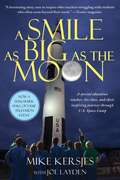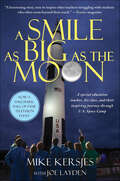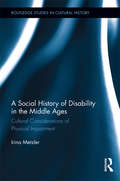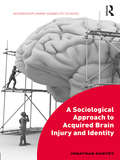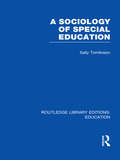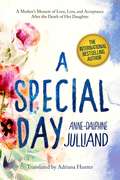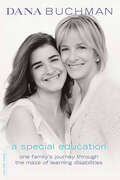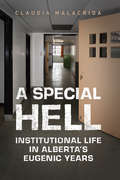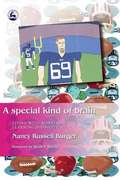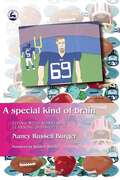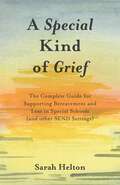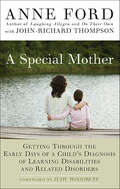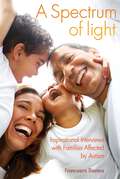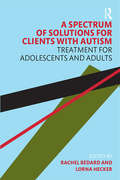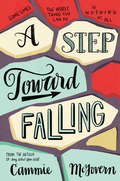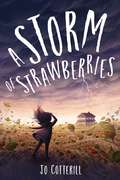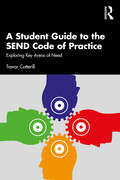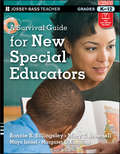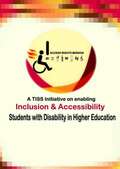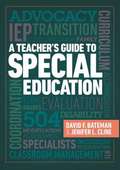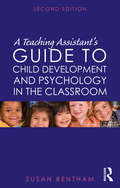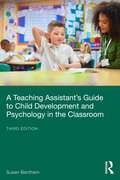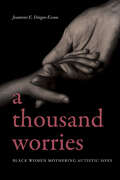- Table View
- List View
A Smile as Big as the Moon
by Joe Layden Mike KersjesMike Kersjes always believed that his students could do anything--even attend the prestigious Space Camp in Huntsville, Alabama, where some of America's best and brightest high school students compete in a variety of activities similar to those experienced by NASA astronauts training for space shuttle missions. The challenge was convincing everyone else that the kids in his special education class, with disabilities including Tourette's syndrome, Down's syndrome, dyslexia, eating disorders, and a variety of emotional problems, would benefit from the experience and succeed. InA Smile as Big as the Moon, Kersjes explains how, with remarkable persistence, he broke down one barrier after another, from his own principal's office to the inner sanctum of NASA, until Space Camp finally opened its doors. After nine months of rigorous preparation, Kersjes's class arrived at Space Camp, where they turned in a performance beyond everyone's expectations.
A Smile as Big as the Moon: A Special Education Teacher, His Class, and Their Inspiring Journey Through U.S. Space Camp
by Joe Layden Mike KersjesThe inspiring true story of how one special education teacher got his class to Space Camp—now a Hallmark Hall of Fame television event.“A heartening story, sure to inspire other teachers struggling with students who often seem beyond their reach.” —Teacher magazineMike Kersjes always believed that his students could do anything—even attend the prestigious Space Camp in Huntsville, Alabama, where some of America’s best and brightest high school students compete in a variety of activities similar to those experienced by NASA astronauts training for shuttle missions. The challenge was convincing everyone else that the kids in his special education class, with disabilities including Tourette’s syndrome, Down’s Syndrome, dyslexia, eating disorders, and a variety of emotional problems, would benefit from the experience and succeed. With remarkable persistence, Kersjes broke down one barrier after another, from his own principal’s office to the inner sanctum of NASA, until Space Camp finally opened its doors. After nine months of rigorous preparation, Kersjes’s class arrived at Space Camp, where they turned in a performance beyond everyone’s expectations.“A testament to how perseverance can get results and how children can perform surprising feats in a system that doesn’t always work to help children.” —Pittsburgh Post-Gazette“Kersjes’s refreshing, heart-warming account proves that faith and vision can yield great things.” —Publishers Weekly
A Social History of Disability in the Middle Ages: Cultural Considerations of Physical Impairment (Routledge Studies in Cultural History #14)
by Irina MetzlerWhat was it like to be disabled in the Middle Ages? How did people become disabled? Did welfare support exist? This book discusses social and cultural factors affecting the lives of medieval crippled, deaf, mute and blind people, those nowadays collectively called "disabled." Although the word did not exist then, many of the experiences disabled people might have today can already be traced back to medieval social institutions and cultural attitudes. This volume informs our knowledge of the topic by investigating the impact medieval laws had on the social position of disabled people, and conversely, how people might become disabled through judicial actions; ideas of work and how work could both cause disability through industrial accidents but also provide continued ability to earn a living through occupational support networks; the disabling effects of old age and associated physical deteriorations; and the changing nature of attitudes towards welfare provision for the disabled and the ambivalent role of medieval institutions and charity in the support and care of disabled people.
A Sociological Approach to Acquired Brain Injury and Identity (Interdisciplinary Disability Studies)
by Jonathan HarveyInspired by the author’s personal experience of sustaining acquired brain injury (ABI), this path-breaking book explores the (re)construction of identity after ABI. It offers a way of understanding ABI through a social scientific lens, promoting an understanding that is generated through close engagement with the lives and experiences of ABI survivors. The author follows the everyday experiences of six male survivors and critically investigates their identity (re)construction after their ABI. As well as demonstrating identity (re)construction after ABI, the experiences of the participants allow the reader to investigate neurological rehabilitation from their perspective. This book suggests that rehabilitation after ABI is often a continual process that extends beyond the formal, medically prescribed period. It also shows that identity after ABI is often (re)constructed in an unpredictable way; a way that emphasises the importance of reciprocal support and the uncertainty of future life. A Sociological Approach to Acquired Brain Injury and Identity is essential reading for academics and students from a range of social scientific disciplines with an interest in biographical or ethnographic research methods. This book offers a social scientific view of rehabilitation and as such is also essential reading for academics, students and professionals with an interest in health and illness, particularly neurological rehabilitation and brain injury rehabilitation.
A Sociology of Special Education (Routledge Library Editions: Education)
by Sally TomlinsonAt the time of original publication, special education in Britain was permeated by an ideology of benevolent humanitarianism and this is ostensibly the moral framework within which the professionals – teachers, educational psychologists, medical officers – operate. The author widens the debate about special education by introducing sociological perspectives and considering the structural relationships that are produced both within the system and in the wider society when part of a mass education system develops separately, as ‘special’ rather than normal. She outlines the origin and development of special education, stressing the conflicts involved and the role played by vested interests, and criticizes the current rhetoric of ‘special needs’. Among the issues and dilemmas that she identifies, the problems of selection, assessment, integration and the curriculum for special schools are discussed in details, and the position of parents, pupils and teachers within the system is examined. The author gives particular attention in a separate chapter to the problems and position of ethnic minorities.
A Special Day: A Mother?s Memoir of Love, Loss, and Acceptance After the Death of Her Daughter
by Anne-Dauphine JulliandFebruary 29th is a date that comes into existence just once every four years. It is also the birthday of Thaïs-author Anne-Dauphine Julliand’s darling daughter-who died of a genetic disease. Thaïs lived just shy of her fourth birthday. She had a short life but good one.As this special day is about to reappear on her calendar for the first time since her daughter passed away, Anne-Dauphine struggles with how to mark this momentous occasion. She wants to live fully on this special day: Thais would have been eight years old. Vivid memories of life with her daughter begin to blend with the present-every gesture, every word evokes a buried memory, arouses laughter or tears. Yet as the date of her daughter's birthday approaches, she knows she must not lose sight of the family who needs her now: her sons Gaspard and Arthur, and Azylis, her other daughter who is also sick.Anne-Dauphine's message remains simple, true, and strong: we all need to be loved and we all need to be happy despite our ordeals. This is both lesson in happiness and a wonderful love story-A Special Day is an honest, inspirational tale that has touched the hundreds of thousands of lives. It will leave the reader breathless with its beauty.Skyhorse Publishing, along with our Arcade, Good Books, Sports Publishing, and Yucca imprints, is proud to publish a broad range of biographies, autobiographies, and memoirs. Our list includes biographies on well-known historical figures like Benjamin Franklin, Nelson Mandela, and Alexander Graham Bell, as well as villains from history, such as Heinrich Himmler, John Wayne Gacy, and O. J. Simpson. We have also published survivor stories of World War II, memoirs about overcoming adversity, first-hand tales of adventure, and much more. While not every title we publish becomes a New York Times bestseller or a national bestseller, we are committed to books on subjects that are sometimes overlooked and to authors whose work might not otherwise find a home.
A Special Education: One Family's Journey Through the Maze of Learning Disabilities
by Dana Buchman Charlotte FarberDesigner Dana BuchmanOCOs chronicle of her daughterOCOs struggle with learning disabilities and of her own journey to become the mother Charlotte needs her to be"
A Special Hell: Institutional Life in Alberta's Eugenic Years
by Claudia MalacridaUsing rare interviews with former inmates and workers, institutional documentation, and governmental archives, Claudia Malacrida illuminates the dark history of the treatment of "mentally defective" children and adults in twentieth-century Alberta. Focusing on the Michener Centre in Red Deer, one of the last such facilities operating in Canada, A Special Hell is a sobering account of the connection between institutionalization and eugenics. Malacrida explains how isolating the Michener Centre's residents from their communities served as a form of passive eugenics that complemented the active eugenics program of the Alberta Eugenics Board. Instead of receiving an education, inmates worked for little or no pay - sometimes in homes and businesses in Red Deer - under the guise of vocational rehabilitation. The success of this model resulted in huge institutional growth, chronic crowding, and terrible living conditions that included both routine and extraordinary abuse. Combining the powerful testimony of survivors with a detailed analysis of the institutional impulses at work at the Michener Centre, A Special Hell is essential reading for those interested in the disturbing past and troubling future of the institutional treatment of people with disabilities.
A Special Kind Of Brain: Living With Nonverbal Learning Disability
by Nancy Russell BurgerSharing the experience of bringing up a child with nonverbal learning disability (NLD), this warm and accessible book offers advice on subjects ranging across diagnosis and therapy, children's interaction with each other, suitable activities for a child with NLD and how to discuss NLD with children. An essential guide, this book will reassure, advise and inform parents and professionals who work with children with NLD.
A Special Kind of Brain: Living with Nonverbal Learning Disability
by Nancy BurgerSharing the experience of bringing up a child with nonverbal learning disability (NLD), this warm and accessible book offers advice on subjects ranging across diagnosis and therapy, children's interaction with each other, suitable activities for a child with NLD and how to discuss NLD with children. An essential guide, this book will reassure, advise and inform parents and professionals who work with children with NLD.
A Special Kind of Grief: The Complete Guide for Supporting Bereavement and Loss in Special Schools (and Other SEND Settings)
by Sarah HeltonChildren with SEND (special educational needs and disabilities), especially those in special schools, often experience grief at a much younger age than others, as some of their peers are more likely to have life-limiting medical conditions. Yet many adults do not know the best way to support a grieving child with SEND. This book provides all the resources that educational professionals need to ensure their community is fully prepared to acknowledge and support pupil bereavement and loss. Issues covered include bereavement and loss policies and procedures, an appropriate curriculum (including the issues of life, death and loss), how to inform the school community of the death, how to support pupils and staff with the loss, common signs of grieving and how grief affects children at different ages and developmental stages, plus activities and resources to support pupils with their grief. There is also an extensive appendix with template documents for schools to use such as draft letters, policies, procedures, curriculum and lesson ideas.
A Special Mother: Getting Through the Early Days of a Child's Diagnosis of Learning Disabilities and Related Disorders
by Anne Ford John-Richard ThompsonAll mothers experience worries and fears about their children, but none can compare with the early days when a mother feels something's not quite right. Anne Ford knows the feeling. She's had it herself, having raised a daughter with severe learning disabilities, and has gone on to share experiences with others during her many years as a volunteer with the National Center for Learning Disabilities.To bring comfort, support, and hard information to mothers-and fathers, too-in the early period surrounding the diagnosis, here is the book that Anne wishes she'd had years ago when she first received the news about her daughter and didn't know where to turn for the practical and emotional help she desperately needed.Filled with essential advice and the voices of other mothers whose children have LD and related disorders such as Asperger's and ADHD, A Special Mother lets parents know they are not alone and that they can help their child to thrive. This invaluable book addresses such matters as:Understanding Learning Disabilities and Related DisordersWhat Should You Do First?Interpreting Evaluation ResultsResolving DisputesSpecial Fathers: They Are Out ThereThe Social Side of LDAdvocacy vs. ObsessionHow Are You Doing?: Taking Care of Yourself
A Spectrum of Light
by Francesca BierensThe emotional trauma that families go through when they find out their child has an autism spectrum disorder can feel like being plunged into darkness. Francesca Bierens is here to show that there is also a light at the end of the tunnel. Over a period of fourteen years, Francesca Bierens interviewed ten families of children on the autism spectrum. This book records their answers: how they felt, how they coped, and what gave them strength and solace. Each family discusses how they reacted when they found out their child had autism, and their feelings leading up to diagnosis. They share their positive and negative experiences of professionals, and describe the support that they received, often from grandparents, respite care givers, support groups and other parents. Two of the original children, now in their 20s, also talk about the experience of growing up with autism, and describe how their lives are now. Above all, Bierens' message, and that of the families she interviews, is one of inspiration and hope, showing that there is light, love and laughter along the way. Their stories should be read by anyone who is affected by or working with autism.
A Spectrum of Solutions for Clients with Autism: Treatment for Adolescents and Adults
by Lorna Hecker Rachel BedardThis book is a comprehensive resource to guide work with individuals on the autism spectrum. It reflects the true range of needs presented by individuals with autism, pulling together the most salient aspects of treatment with invaluable information from several disciplines synthesized to guide your work. Divided into topical sections with chapters from three field experts in each, this book features contributions from therapists, educators, and medical doctors, as well as financial planners, health advocates, and innovators. The diverse disciplines and backgrounds of each author lend a different voice and perspective to each chapter, reflecting the continuum of care necessary when working with clientele on the autism spectrum, and that, for clients on the spectrum, one solution does not fit all. For use by psychotherapists, counselors, applied behavioral analysts, occupational therapists, social workers, teachers, and more, this text presents readers with expertise from various contributing disciplines to give them a treatment resource that can inform and guide their daily work with clients on the autism spectrum.
A Step Toward Falling
by Cammie McgovernCammie McGovern follows up her breakout young adult debut, Say What You Will, with this powerful and unforgettable novel about learning from your mistakes, and learning to forgive. Told in alternating points of view, A Step Toward Falling is a poignant, hopeful, and altogether stunning work that will appeal to fans of Jennifer Nevin, Robyn Schneider, and Jandy Nelson. Emily has always been the kind of girl who tries to do the right thing -- until one night when she does the worst thing possible. She sees Belinda, a classmate with developmental disabilities, being attacked. Inexplicably, she does nothing at all. Belinda, however, manages to save herself. When their high school finds out what happened, Emily and Lucas, a football player who was also there that night, are required to perform community service at a center for disabled people. Soon, Lucas and Emily begin to feel like maybe they're starting to make a real difference. Like they would be able to do the right thing if they could do that night all over again. But can they do anything that will actually help the one person they hurt the most?
A Storm of Strawberries
by CotterillTwelve-year-old Darby loves living on her family's strawberry farm. But a big storm is coming, and it threatens to destroy everything she and her family hold dear.Darby is twelve years old and has Down syndrome. Her favorite things are music, chocolate, and her big sister Kaydee. It's a big weekend for Darby. It's time for their annual chocolate hunt, and it's all she can think about. Well, that and spending time with her big sister. But this year Kaydee's friend Lissa is staying over for the weekend, and she seems to be stealing all of Kaydee's attention. And to make things worse, the strawberry farm is hit by a tornado. Suddenly, it's as though both the chocolate hunt and her sister are slipping away from her. Although the family is prepared for the tornado, they aren't prepared for the storm of emotions that surface when a truth is brought to light. With tension rising within the family, can Darby mend what's been broken when it seems like no one is listening to her? A Storm of Strawberries is a warm, thoughtful, and empathetic novel from acclaimed author Jo Cotterill.
A Student Guide to the SEND Code of Practice: Exploring Key Areas of Need
by Trevor CotterillIn this essential textbook for students, Trevor Cotterill delves into the four broad areas of need identified in the SEND Code of Practice (2015), providing a spotlight on current research into a range of identified difficulties as well as outlining the appropriate pedagogical approaches required to support these needs in children and young people. Closely mirroring the SEND Code of Practice (2015), each distinct area of need associated with cognition and learning, communication and interaction, physical and sensory issues and social, emotional and mental health difficulties features essential overviews of research and current thinking within each area. Supported with case studies, learning objectives and reflection points, this text includes discussions on autistic spectrum disorders, profound and multiple learning difficulties, ADHD, mental health, physical and sensory difficulties and adverse childhood experiences as they relate to the SEND Code of Practice (2015). Fully endorsed by evidence-based research involving children, young people, adults and their families, this text encourages students to understand that SEND is a complex area and provides opportunities to reflect on previous experience, harnessing them with knowledge for future practice. Concise yet rigorous in its explanations and coupled with signposted activities and suggestions for further reading throughout, A Student Guide to the SEND Code of Practice will be invaluable to undergraduate students undertaking a programme of study incorporating special educational needs and disability as a single or joint honours.
A Survival Guide for New Special Educators
by Mary T. Brownell Margaret L. Kamman Bonnie S. Billingsley Maya IsraelWhat every special education teacher needs to know to survive and thriveA Survival Guide for New Special Educators provides relevant, practical information for new special education teachers across a broad range of topic areas. Drawing on the latest research on special educator effectiveness and retention, this comprehensive, go-to resource addresses the most pressing needs of novice instructors, resource teachers, and inclusion specialists.Offers research-based, classroom-tested strategies for working with a variety of special needs studentsCovers everything from preparing for the new school year to behavior management, customizing curriculum, creating effective IEPs, and moreBillingsley and Brownell are noted experts in special educator training and supportThis highly practical book is filled with checklists, forms, and tools that special educators can use every day to help ensure that all special needs students get the rich, rewarding education they deserve.
A TISS Initiative on enabling Inclusion and Accessibility for Students with Disability in Higher Education
by Prof S. Parasuraman Dr. Vaishali KolheThe "I Access Rights Mission" (IARM) is an innovative initiative by Tata Institute of Social Sciences (TISS) and Centre for Disability Studies + Action (CDSA) to promote inclusion and accessibility for students with disabilities in higher education. By implementing a rights-based framework, involving stakeholders and utilizing international and national protocols, IARM aims to create an inclusive learning environment that addresses individual needs, eliminates barriers, and fosters mutual confidence. Through a cultural shift towards acceptance and diversity, IARM seeks to empower students with disabilities to become active participants in education and society, ensuring equal opportunities and rights for all.
A Teacher's Guide to Special Education
by David Bateman Jenifer ClineDespite the prevalence of students with disabilities in the general education classroom, few teachers receive training on how to meet these students' needs or how to navigate Despite the prevalence of students with disabilities in the general education classroom, few teachers receive training on how to meet these students' needs or how to navigate the legally mandated processes enumerated in the Individuals with Disabilities Education Act (IDEA). What is their role? What are their responsibilities? What are the roles and rights of parents? And what must all teachers do to ensure that students with disabilities and other special needs receive the quality education they're entitled to? In this practical reference, David F. Bateman--bestselling author of A Principal's Guide to Special Education --and special education administrator Jenifer L. Cline clarify what general education teachers need to know about special education law and processes and provide a guide to instructional best practices for the inclusive classroom. Topics covered include The pre-referral, referral, and evaluation processes Individualized education programs (IEPs) and the parties involved Accommodations for students who do not quality for special education, including those covered by Section 504 Transition from preK to K-12 and from high school to postschool life Classroom management and student behavior Educational frameworks, instructional strategies, and service delivery options Assessment, grades, graduation, and diplomas The breadth of coverage in this book, along with its practical examples, action steps, and appendixes covering key terms and definitions will provide the foundation all K-12 teachers need to successfully instruct and support students receiving special education services. It's an indispensable resource for every general education classroom. the legally mandated processes enumerated in the Individuals with Disabilities Education Act (IDEA). What is their role? What are their responsibilities? What are the roles and rights of parents? And what must all teachers do to ensure that students with disabilities and other special needs receive the quality education they're entitled to? In this practical reference, David F. Bateman--bestselling author of A Principal's Guide to Special Education --and special education administrator Jenifer L. Cline clarify what general education teachers need to know about special education law and processes and provide a guide to instructional best practices for the inclusive classroom. Topics covered include The pre-referral, referral, and evaluation processes Individualized education programs (IEPs) and the parties involved Accommodations for students who do not quality for special education, including those covered by Section 504 Transition from preK to K-12 and from high school to postschool life Classroom management and student behavior Educational frameworks, instructional strategies, and service delivery options Assessment, grades, graduation, and diplomas The breadth of coverage in this book, along with its practical examples, action steps, and appendixes covering key terms and definitions will provide the foundation all K-12 teachers need to successfully instruct and support students receiving special education services. It's an indispensable resource for every general education classroom.
A Teachers' Guide to the Special Educational Needs of Blind and Visually Handicapped Children
by Sally S. MangoldSuggestions and ideas from educational officials on how to provide additional support to blind students in the classroom setting.
A Teaching Assistant's Guide to Child Development and Psychology in the Classroom: Second edition
by Susan BenthamHow can you help students most effectively in the classroom? As a Teaching Assistant, you play a vital role in today’s schools. This fully updated new edition will help you get to grips with the main issues to do with psychology and its role in the processes of teaching and learning. This accessible text, building on the success of a best-selling previous edition, provides informative, yet down-to-earth commentary with clear examples of how you can apply this knowledge in everyday practice. The book addresses issues including: how to support learning how to identify and cater for different learning styles teaching children with additional needs how to manage behaviour to support learning how to help children with their self-esteem and independence. This new edition includes references to up-to-date research in child development and psychology to include information regarding personalised learning, creativity, motivation, friendships skills, moral development and neuroscience. Chapters are complemented with lively case studies, self-assessment questions and examples of how to apply theory to everyday classroom practice. The reader is encouraged to develop reflective practice to best support childrens’ behaviour and learning. This reader-friendly book is an invaluable companion for every Teaching assistant, HLTA, Cover Supervisor, and anyone working in a supporting role in an educational setting.
A Teaching Assistant’s Guide to Child Development and Psychology in the Classroom
by Susan BenthamHow can you help students most effectively in the classroom? As a teaching assistant, you play a vital role in today’s schools. This fully updated third edition will help you get to grips with the main issues to do with psychology and its role in the processes of teaching and learning.This accessible text provides informative, yet down-to-earth commentary with clear examples of how you can apply this knowledge in everyday practice. This book addresses issues such as how to support learning and behaviour, how to create an optimal learning environment for all students, ways to encourage pupil voice, supportive strategies for children with additional needs, and how to help children with their self-esteem and independence. This new edition includes references to up-to-date research in child development and psychology to include information regarding wellbeing, mental health, and learning strategies related to insights from cognitive science. Chapters are complemented with lively case studies, self-assessment questions, and examples of how to apply theory to everyday classroom practice. The reader is encouraged to develop reflective practice to best support children’s behaviour and learning.This reader-friendly book is an invaluable companion for every teaching assistant, HLTA, pastoral support assistant, learning mentor, classroom cover supervisor and anyone working in a supporting role in an educational setting.
A Team of Two (Houghton Mifflin Harcourt Vocabulary Readers #Leveled Reader: Level: 5, Theme: 4.2)
by Minnie TimentiIntroduction to assistance dogs.
A Thousand Worries: Black Women Mothering Autistic Sons (SUNY series in Black Women's Wellness)
by Jeannine E. Dingus-EasonAutism is rising across the United States but disproportionately affects Black children and their families. While White middle-class families tend to be the focus of autism research and services, A Thousand Worries tells the stories of fifteen Black mothers of autistic sons, including the author’s own story. Interweaving her personal experience and research findings, Jeannine E. Dingus-Eason examines the intersections of race, class, and gender and the complexities of parenting, care, and services for Black autism mothers, or BAMs. Dingus-Eason shows how BAMs leverage their faith, support networks, and knowledge of autism to advocate for their sons in cultural and sociopolitical contexts that consistently dehumanize, criminalize, and adultify Black boys. A Thousand Worries will give families, scholars, and practitioners in education, social work, human services, and health insight into not only BAMs' many concerns and challenges but also their strengths, strategies, and abiding love. At times moving, uplifting, funny, and raw, their testimonies illuminate the power dynamics between parents and providers, the value of supportive partnerships and mutual trust, and the need for culturally responsive services.
